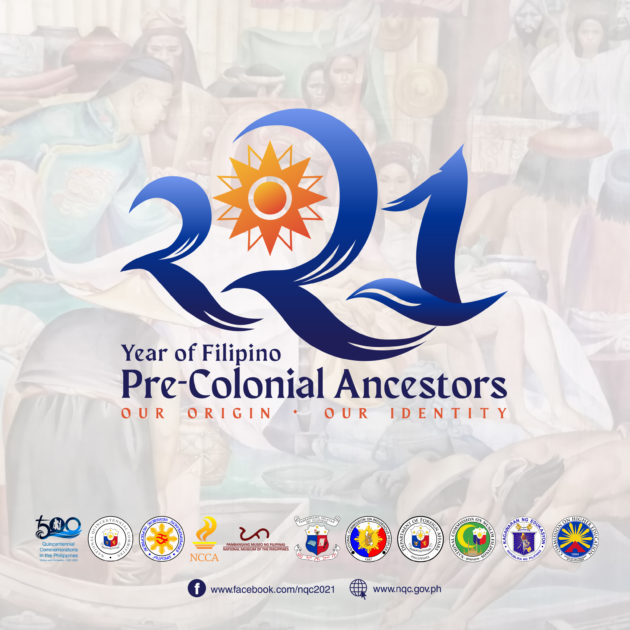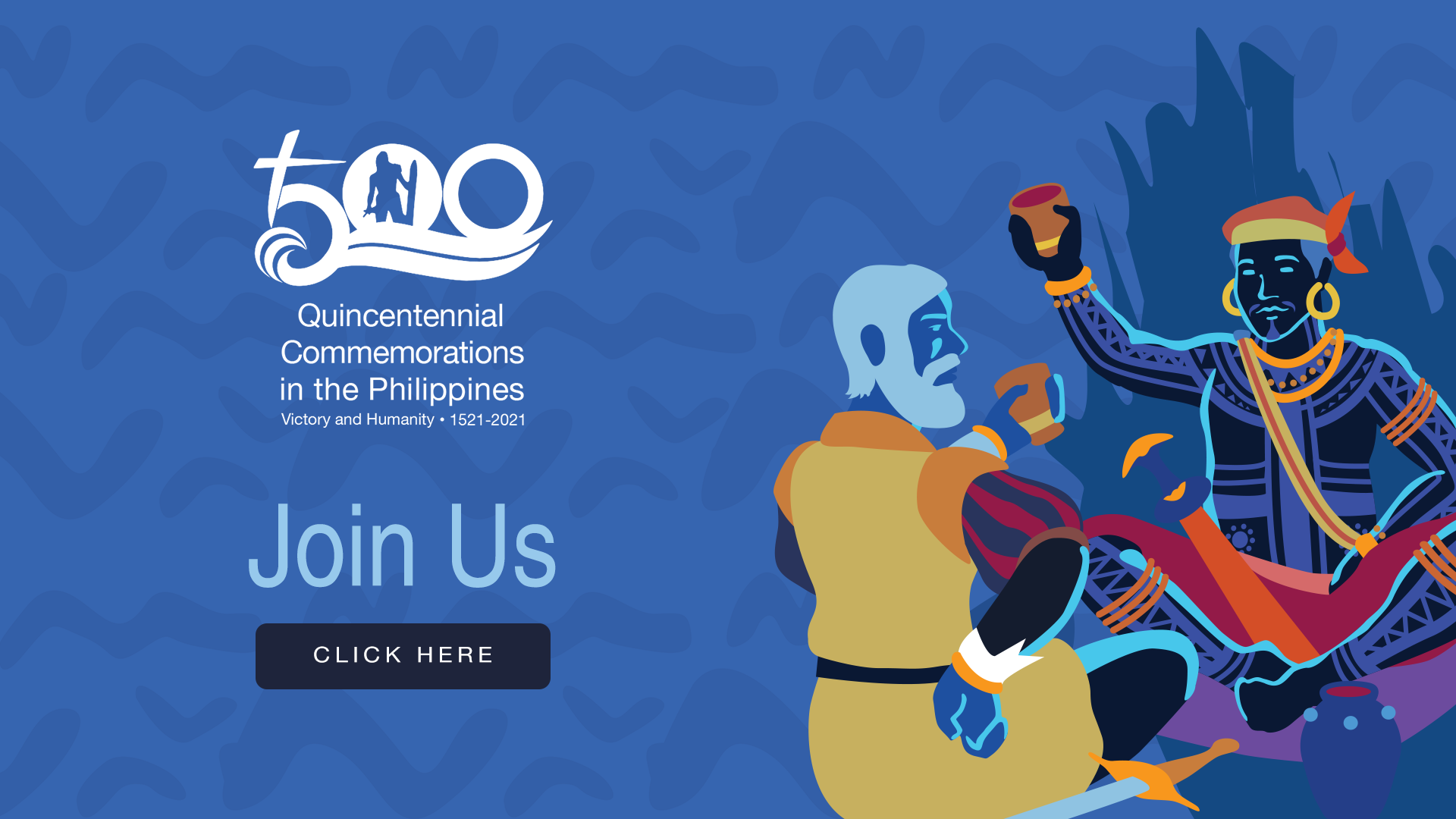Victory and Humanity
Posted on 27 August 2021
By National Quincentennial Committee Secretariat
2021 National Heritage Month, History Month, and National Heroes Day have something in common–they all bear the words “Victory and Humanity.” But what do these words mean?
During its 8th regular meeting on 14 August 2019, the National Quincentennial Committee (NQC) of the Philippine government adopted “Victory and Humanity” as the theme of the 2021 Quincentennial Commemorations in the Philippines (2021 QCP). The theme is guided by the transcendental message history wants to convey to the present-day Filipinos: that our ancestors bequeathed us values we need to realize–the value of life and freedom.
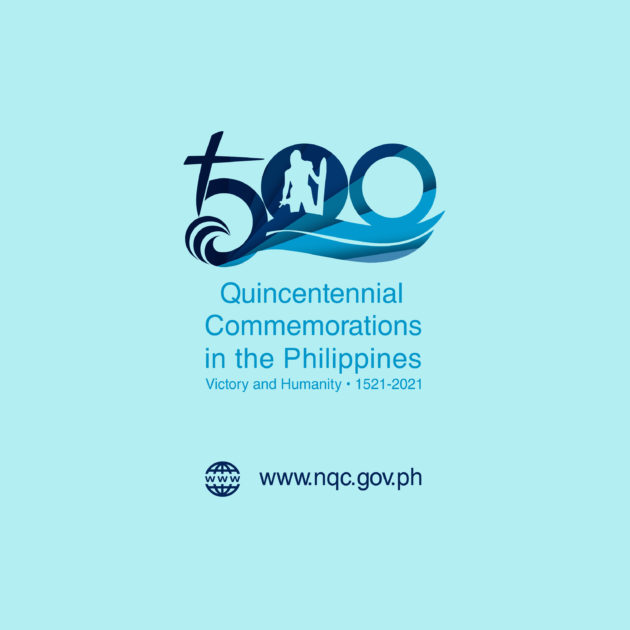
Victory pertains to the successful defense of our ancestors in Mactan, an island in the Visayas, to their way of life threatened by Ferdinand Magellan, the captain-general of a Spanish expedition sent to Asia, the Armada de Maluco (a.k.a., Magellan-Elcano expedition). Called the Battle of Mactan on 27 April 1521, the victory of our ancestors against Magellan may be insignificant to non-Filipinos but it undeniably affected the destiny and destination of the expedition because its captain-general died in the battle. It may be small if contextualized in its time, but Filipino heroes and thinkers of the 19th century elevated it into national.
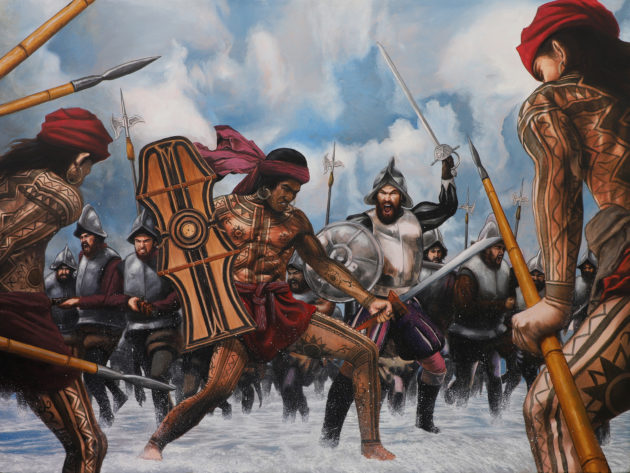
Jose Rizal gave importance to Lapulapu, one of the rulers of Mactan who defied the Spanish king, making Magellan irked and led the attack on the island. Rizal’s fellow, Juan Luna, a known painter in Europe, reimagined the Battle of Mactan in an artwork. The Ilocano master deemed to baptize it “The Victory of Si Lapulapu and the Retreat of the Spaniards.” Because the time was not ready for such revolutionary thought, he titled it “The Death of Magellan” instead.
In 1895, Emilio Jacinto, a high-ranking official of the Katipunan or the society whose plan was to topple down the Spanish regime, used the memory of Lapulapu in a poem, motivating the anak na bayan (‘children of the nation’) that in their veins run the blood of the “jubilant king of Mactan” who “killed the liar Magellan.” The following year, 1896, the Katipunan led the Philippine Revolution. Two years later, on 12 June 1898, Philippine independence from Spain was proclaimed and gave birth to a republic democratic in style and with a constitution, actually the first of its kind in the whole of Asia.

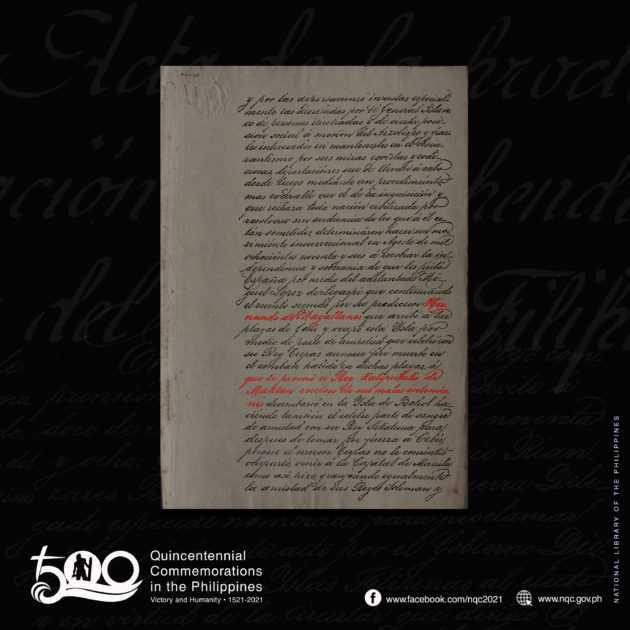
On the other hand, Humanity commemorates the compassion of our ancestors from Suluan, an island now under the jurisdiction of Guiuan, Eastern Samar, to Magellan when the latter arrived on the Philippine shore in March 1521. This may appear absurd to the nationalist facet of a Filipino. But the arrival of Magellan in Eastern Samar is deeply ingrained in the mindset of the locals, more so in the province’s local history. Thus, the need for the national government to respect this local preference.
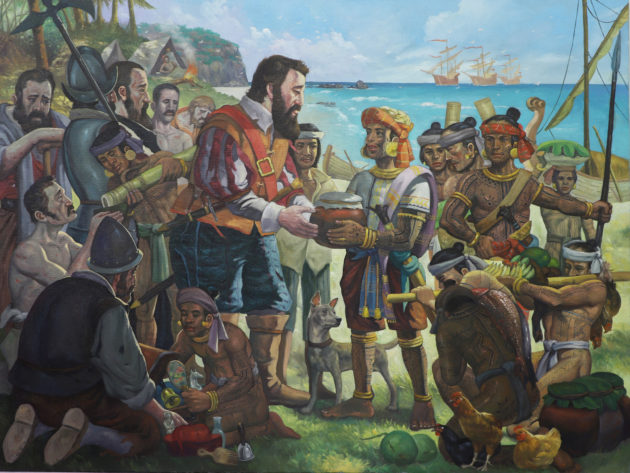
Nevertheless, with the support of the Municipality of Guiuan, the Province of Eastern Samar, the Department of Tourism Eastern Visayas, and the Office of the Presidential Assistant for the Visayas, the NQC was able to introduce a Filipino way of looking at the arrival of a foreigner: and that was to underscore the active role of our Waray ancestors from Suluan had played at the onset of the Philippine part in the first circumnavigation of the world (16 March – 28 October 2021). On 18 March 1521, in the nearby island of Homonhon, also under Guiuan town, our ancestors from Suluan discovered the starving, undernourished, scurvy-stricken, and dehydrated crew of Magellan. These strangers just appeared in the hallowed (and uninhabited) island of Homonhon. They endured almost four months of a voyage in the Pacific from South America (which Magellan underestimated as a “sea”) without decent food and water. They consumed leather, wood, and biscuits as hard as a rock with rat urine. This was also called the 500th anniversary of the Philippine-Spanish contact (not the 500th anniversary of the arrival of Ferdinand Magellan nor the 500th anniversary of the discovery of the Philippines).
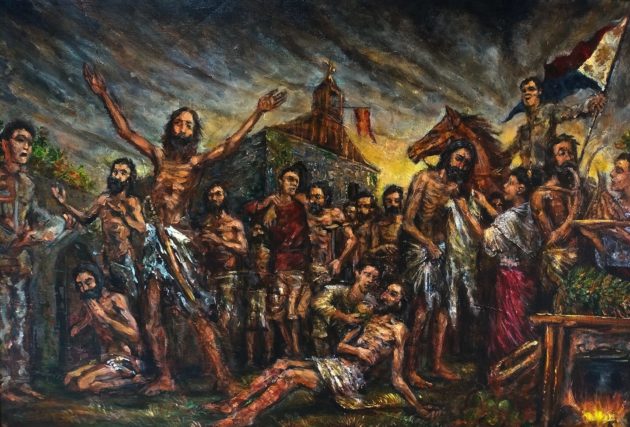
The transcendental message of the quincentennial theme, Humanity, reminds us also that we are heroes, too, not only to our own people but to other peoples. The compassion our ancestors in Homonhon showed the dying crew of Magellan—actually the earliest known encounter of our ancestors with the Spaniards in recorded history—was bookended by the same kindness our Revolutionary Forces demonstrated the last Spanish soldiers in the Philippines who fortified themselves inside Baler Church, in the hometown of Quezon, from June 1898 to June 1899: they were fed, sent drinks, cigarettes and provisions until they surrendered to the already transformed Philippine Republican Army. We will encounter again the same magnanimity in 1614 when we received the Japanese Christians banished out of Japan following the outlawing of Christianity by Tokugawa Ieyasu; the White Russians expelled out of USSR and communist China in 1949, who were received in the same town that sheltered Magellan: Guiuan; and many more. Beyond hospitality, we Filipinos inherited from our ancestors and forebears the gift of magnanimity.
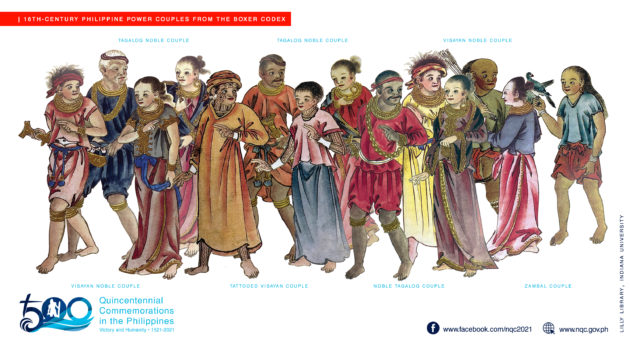
Victory and Humanity as the quincentennial theme is best appreciated in the 2021 QCP theme song, “Bagani” (‘warrior’ in Manobo). The line in the song, “Bayaning Pilipino sa makabagong panahon” (Filipino heroes in the modern time), encourages each and every Filipino of the modern time to be a hero not only to our countrymen but to humankind. Listen to the song via Spotify or YouTube.
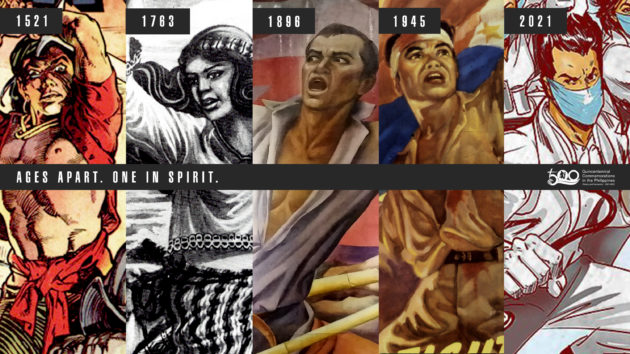
Readings
The following are links to further explain the 2021 Quincentennial Commemorations in the Philippines:
- Does the Philippine government celebrate colonization?
“The NQC had already settled this issue during its first meeting in June 2018. The committee assures the Filipino people that we will not celebrate the discovery of the Philippines. We will commemorate the quincentennial the Filipino way, which means we will raise the awareness of our countrymen about the rich yet challenging pre-Hispanic or pre-colonial history.”
-Undersecretary Anthony Gerard Gonzales, Office of the Presidential Assistant in the Visayas
Read more [bit.ly/DiscoveryNoMore]
- Who are we glorifying in the arrival of Magellan?
Definitely our ancestors.
“When we refer to the people of Suluan who exhibited kindness to the dying Magellan-Elcano expedition on this very same day, 500 years ago, we acknowledge that they are part of our being. For obvious reasons, they were not Filipino, and that there was no Philippines yet. But the National Quincentennial Committee opts to remember them because we descended from them. We include them in the global commemoration of the first circumnavigation of the world. We desire to enter their world least explored. We are ever curious who were they. Nobody will understand them better than us. No one in this world will ever appreciate them more than us, modern-day Filipinos. They are not just part of our being—they determined who are we today. Through our ancestors, we will have a better appreciation of who we are and be conscious of the things we often take for granted.”
-Dr. Rene R. Escalante, National Historical Commission of the Philippines
Read more [bit.ly/OurAncestors].
- Why the need for a national celebration in honor of Lapulapu who was not a Filipino?
“It is correct to say that Lapulapu was not a Filipino because of the fact that the “Philippines” had not yet existed at that point in history, and if it had, he would be the first one to defy its formation. But in the last half of the 19th century, our heroes took the name “Filipino” as their own and as a collective name for the hundred-plus Philippine cultural communities (e.g., Cebuano, Maranao, Ilokano, Ivatan) that existed in the country. The “Philippine” territory became the space imagined by the Katipunan to be freed and made sovereign in 1896. In 1898, the Philippines arose as an independent nation.”
-Xiao Chua, Philippine Historical Association
Read more [bit.ly/PinoyByHeritage]
- 2021 is the 500 Years of Christianity. Why compete?
The NQC is not in competition with the church sector. The 500th anniversary of the introduction of Christianity in the Philippines, as a historic event with cultural relevance to the Filipinos, is just one of the thirty-four quincentennial milestones in Philippine history [see nqc.gov.ph/en/34qcp/]. Per Executive Order Nos. 55 (s. 2018) and 103 (s. 2020), the NQC mandated to commemorate these events.
Read more [nqc.gov.ph/en/about/]
- Why not just focus on the 500 Years of Christianity?
The national government is limited only to historical, cultural, and academic aspects of the religious celebration. Read more [bit.ly/NQCwith500YOC]
- The Quincentennial is nothing but about Magellan? So why should we bother to commemorate it?
“The National Quincentennial Committee and the National Historical Commission of the Philippines decided to join the global commemoration of the first circumnavigation of the world to raise the awareness that our ancestors were not savages, like how Western writers and artists depicted them in books and artworks.”
-Dr. Rene R. Escalante, National Historical Commission of the Philippines
Read more [bit.ly/QAgenda21]
- How sure are we that the NQC is commemorating the quincentennial the Filipino way?
“Most of us were taught that Philippine History only began when Magellan arrived in our country in 1521. This is wrong. Because of this, there is a need to intensify our campaign to correct this myth in our life as a nation. It is for this reason that the Philippine Government declared the year 2021 as the Year of Filipino Pre-Colonial Ancestors. Moreover, the 2021 Quincentennial Commemorations in the Philippines are rebranded to favor the lens and voice of the Filipinos in revisiting the 500th anniversary of the Philippine part of the first circumnavigation of the world by not calling it the ‘discovery of the Philippines’ nor ‘the arrival of Ferdinand Magellan.'”
Read more [bit.ly/FilipinoViewpoint]
- Where can we see updates on the Quincentennial?
You may visit the Facebook page of the NQC here.
